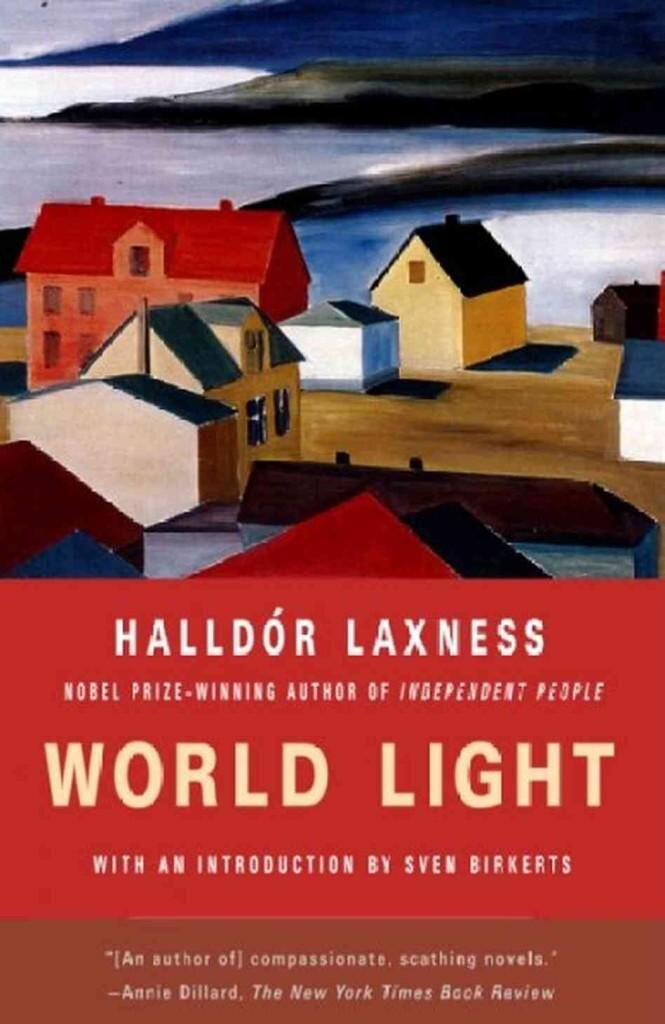Seeing the light with Halldor Laxness’ “World Light”
Ian Tracy Gwin, Staff Reporter
Originally published November 14, 2013
Every so often, you find yourself in a situation where the clichés you have always heard but tried to ignore become as real as stone and wood. At these moments you’re not the stoic protagonist you have always depicted as yourself; you are, in truth, a nameless actor silently rehearsing their part in some ancient drama too old and far away to relate to anyone known, including yourself.
In these times you find this person saying, doing, and thinking things that you never thought you would be doing—familiar things that feel completely natural. That which had occupied you beforehand fades into black and you are delivered beside yourself.
I admit it: these are my personal feelings. But I will attempt to substantiate the mystery of emotion with a few words I never expected myself to say:
World Light (translated by Magnus Magnusson, University of Wisconsin Press, 1969) is one of the best books I have ever read. I laughed, I cried, I jumped for joy, I squirmed in anguish, and I closed its covers yesterday feeling better than I had in a long time.
Published in four parts between 1937 and 1940, the novel (titled Heimsljós in its original Icelandic) is the work of author and Nobel-prize winner Halldor Laxness. Born in a world immersed in epic myth and storytelling, Laxness drew from the social, political, historical, and philosophical practices embedded in the fields and glaciers of his native Iceland, writing plays, poetry and novels.
The seed of World Light emerged from the true story of a turn of the century Icelandic folk poet named Magnus Hjaltason Magnusson. From the diaries, letters, and papers depicting Magnusson’s hard and brief life, Laxness created Olaf Karason, an orphan sent to the country an infant in rags and destined to die the same way a poet.
The novel is a bildungsroman, a German word coined for tales that depict the “coming of age” of a character—literally translated as “a novel of education/formation/culture.” Famous examples of the genre include Persepolis by Marjane Satrapi or A Portrait of the Artist as A Young Man by James Joyce.
Light’s four separate novellas depict chronologically the life of Karason, beginning with his bed-ridden days as a crippled “parish pauper” and the miraculous healing by a supernatural woman, to his life in the rural town of Svidisnik and his affairs with women, politicos, priests, mad doctors, lunatics, and schoolchildren. The plot, populated with memorable minor characters, observations, and mis en scene, takes its jabs in turn at Iceland’s poverty, national relations, and economy.
Heartbreaking when it is not comic, exultant when it is not maudlin, Laxness’ toying prose pushes and pulls with a deadpan roll of the snare and the screech of the world’s smallest violin. World Light rises to the arid mountains and plunges into the deep sea, black and green, with only an ellipses. More suspenseful than Jason Bourne and more heartbreaking than Downton Abbey (if that is not heartbreaking enough, replace it with another contemporary tearjerker), Karason’s story will draw, surprise, and bewitch you.
The mythology of World Light reads as tantalizingly familiar, even legendary; at times it sounds as if echoed from the Bible, at other moments derived from a play of Elizabethan Romance, and in others based on a comic novel along the lines of Cervantes’ Don Quixote. Karason’s character, a romantic martyr suffering for his doomed art through his precocious innocence, seems to contain in a microcosm the history of literature and the written word.
A major motif of World Light occurs in the pitting of opposites for and against each other. From its characters, plot, description, and even down to its very sentences, the novel illuminates the shadow dance of yin and yang, and perhaps even the very nature of conflict and opposition itself.
Consider this passage depicting Karason, working as a schoolteacher in a remote village, attempting – with a fiction about her lost lover – to console a distraught farm girl:
“’He asked me to remind you that whenever people’s lives appear to be harmony itself- perfect love, an ideal family, comfortable circumstances – life isn’t real, either, and certainly only half a life. A whole heart – half a life. He asked me to tell you that life is governed by opposites and is always in conflict with itself, and that’s why it is life. To have lost what one loved most is perhaps the only real life. At least, anyone who doesn’t understand that, doesn’t know what it is to live; doesn’t know how to live, and, what’s worse, doesn’t know how to die.’”
In his History of Icelandic Prose Writers 1900-1940, author Stefan Einarsson compares the novel to a symphony. The music of Laxness’ story, heard as one travels through its unique and oceanic flow of time, seems to transcend the mere telling of a tale and the sole composition of a piece of art. World Light reminds one of all the things a novel is capable of doing without refraining from doing them; it is the question and the answer, an unsolvable riddle, the melodic tune of passage you can’t seem to remember.
Despite having little knowledge or experience of the place, I found Iceland’s culture in the novel completely relatable. The book feels as though it were written at a time and place as far as it is near.
In the end, it is Laxness’ heightened mastery of the novel and its form which makes World Light truly for the world: much like history’s most universal bards – such as Shakespeare and Dante – his profound ruminations can resound in the heart of nearly any reader. Consider this passage about Karason’s rejection by a village girl:
“This is not the first time that those who had first smiled at him turned their backs on him and began to think of themselves instead of thinking of him. Sometimes it was as if you understood people’s souls; a few days later, you understood nothing. One day you were kissed, and it meant everything; next day, you were not kissed.”
Isn’t that exactly what high school is? Who has not felt that plunge of a loss we find in the impermanence of our so often generalized but seldomly elaborated lives? It is passages like these that make one truly wonder at how many people can fill the world and live their lives, even as neighbors, without the simple revelation that the greatest mysteries they face are closely harbored too by both friends and strangers alike. Honestly, I could write all day about this work, but, after all is said and done, it stands for itself.
Related somewhat to that feeling of cliché I mentioned in my introduction is the eerie fate of coincidence, synchronicity, and déjà vu that seems to confound science and reason; it is the stuff of planets aligning, magic numbers, and astrology. In that instant everything is understood, and you’ve been set free – but arriving back again are the circles of tedium, the silent machinery of the years slipping and the ghosts of chances passing.
Between hidden and found, the Holy Grail and a metal folding chair, lies World Light. As simply as one reads a page and feels that they have been spoken to down to the pit of their soul, so too the coincidences, crossroads, and hinges of our lives dovetail in and out of each other like truth and lies, hope and anguish, the seeing and the seen, dead or alive.

























